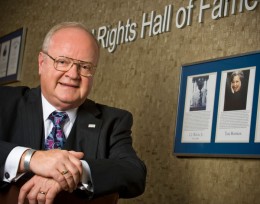
J. Michael Bernstein, assistant dean at the Raj Soin College of Business, said the Ohio Civil Rights Hall of Fame was created in part because Wright State University wanted to help make it happen.
The Ohio Civil Rights Hall of Fame, which honors and showcases individuals who have advanced civil rights in Ohio, will induct its third class of enshrinees at the Ohio Statehouse on Oct. 13.
Wright State played a key role in the founding of the hall and continues to be a strong supporter.
“It’s where it is today because we are a part of it,” said J. Michael Bernstein, assistant dean at the Raj Soin College of Business. “Diversity is a big part of our campus.”
The hall was born after conversations at Wright State in 2007 between university officials and G. Michael Payton, executive director of the Ohio Civil Rights Commission. Wright State agreed to join Honda of America and the National Underground Railroad Freedom Center as founding partners.
The first class of inductees was enshrined in 2009. Last year, Wright State nominated William McCullough, an Ohio congressman who was instrumental in helping pass the Civil Rights Act of 1964. McCullough was among 10 enshrinees.
Bernstein said supporting the hall of fame is important in the fight against discrimination.
“The best way we can overcome discrimination is through education–to show the public that people of all colors, of all beliefs contribute to making this a better world to live in,” he said. “It’s the right thing to do.”
This year’s inductees include Roger Ambramson, Theodore M. Berry, Ken Campbell, Nathaniel R. Jones, Dr. Amos H. Lynch, Louis D. Sharp and V. Anthony Simms-Howell.
Wright State also plays host each year to a public hearing by the Ohio Civil Rights Commission, the only school in the area to do so. Last May, the hearing drew more than 250 students and others to the campus.
The commission, established in 1959 as the Fair Employment Practices Commission, enforces Ohio’s laws against discrimination due to race, color, religion, sex, national origin, disability, ancestry and age.
As a quasi-judicial, administrative state agency, the commission investigates complaints of unlawful discrimination in employment, housing, public accommodations, credit and institutions of higher education. It also develops educational programs for students and other residents designed to help eliminate prejudice, its harmful effects and its incompatibility with American principles of equality and fair play.

 Wright State gold team captures 2024 Horizon League team title, Flynn individual champion
Wright State gold team captures 2024 Horizon League team title, Flynn individual champion  118 medical students to graduate from Wright State’s Boonshoft School of Medicine April 28
118 medical students to graduate from Wright State’s Boonshoft School of Medicine April 28  Wright State University continues to demonstrate its financial strength with another credit rating upgrade from Moody’s
Wright State University continues to demonstrate its financial strength with another credit rating upgrade from Moody’s  Thousands celebrate the end of Spring Semester with food, fun and friendship
Thousands celebrate the end of Spring Semester with food, fun and friendship  Nearly 1,500 students to graduate at Wright State’s spring commencement ceremonies
Nearly 1,500 students to graduate at Wright State’s spring commencement ceremonies 